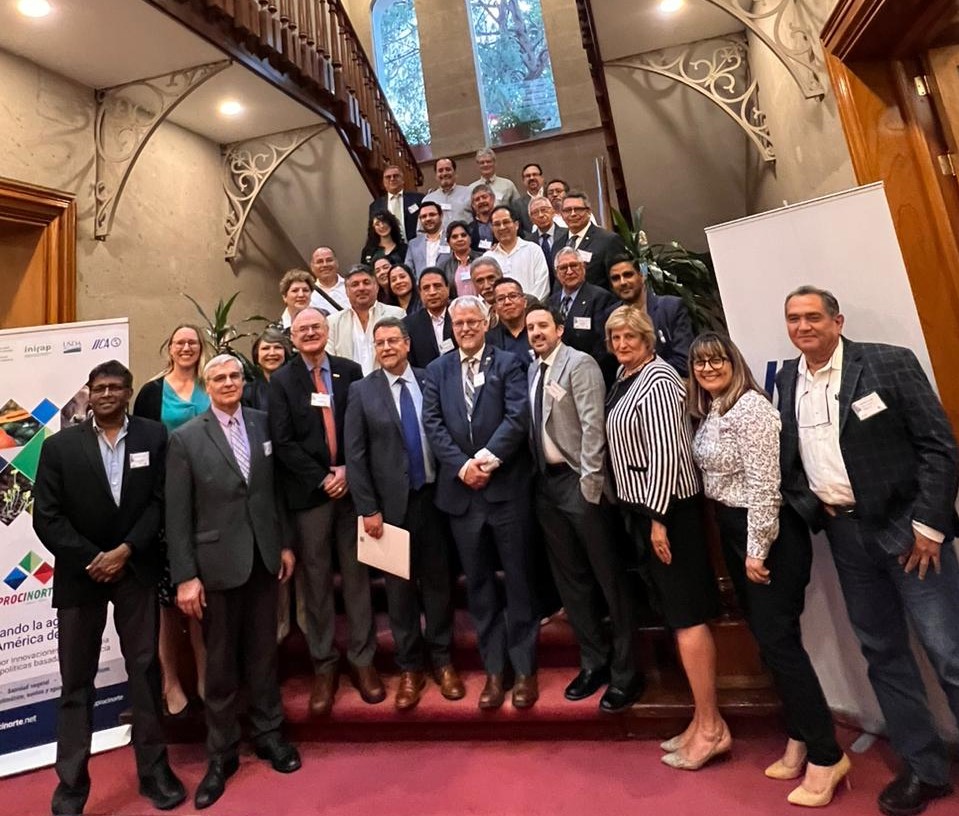At an event in Mexico, authorities and technical officers of the Cooperative Program in Research and Technology for the Northern Region (PROCINORTE) outlined its achievements in animal and plant health, genetic resources, climate change, soils and water.

San Jose, 13 June 2023 (IICA). The Cooperative Program in Research and Technology for the Northern Region (PROCINORTE)—an IICA-supported network of agricultural research bodies in Canada, Mexico, and the USA—celebrated its 25th anniversary, highlighting its vital role in furthering competitive and sustainable agricultural development throughout the hemisphere, by incorporating science, technology, innovation and knowledge exchange in the areas of animal and plant health, genetic resources, climate change, soils and water.
Established in 1998, PROCINORTE is comprised of Agriculture and Agri-food Canada (AAFC), the Agricultural Research Service of the United States Department of Agriculture (USDA-ARS) and Mexico’s National Institute for Forestry, Agricultural and Livestock Research (INIFAP). The Inter-American Institute for Cooperation on Agriculture (IICA) serves as the Executive Secretariat of the Program.
Manuel Otero, Director General of IICA, participated virtually in the celebration, which took place at the Universidad de California in Mexico. He was joined by Steven Kappes, USDA-ARS Associate Administrator for National Research Programs and President of PROCINORTE; Sergio Paulo; Director of Research in the Development Center, Science and Technology Branch of AAFC; and the Director General of INIFAP, Luis Ángel Rodríguez del Bosque.
Also present were the IICA representatives in Canada and Mexico, Jean Charles Vallée and Diego Montenegro, respectively.
Steven Kappes remarked that, “As President of PROCINOTE, I have seen how the Program has evolved and created an environment that facilitates effective collaboration, enabling us to combine our experience, capacities and resources to address national and transboundary challenges to benefit farmers and rural establishments”.
Sergio Paulo of the AAFC said that PROCINORTE has the clear objective to strengthen food security in North America and the world.
“During these 25 years, the Program has developed capacities and experience to tackle disease in agriculture, prevent its spread and foster trade throughout the hemisphere. We have also made great strides in plant genetics. Canadian material in relation to the plant system has been made available for genetic development research purposes and education. In terms of the livestock sector, the aim is to assist farmers to take action on climate change. We are passionate about sustainability and food security”, he said.
INIFAP’s Luis Ángel Rodríguez del Bosque stated that, “We have worked on several animal health-related problems in different species of birds, pigs and cattle. One of the extremely important things that PROCINORTE does it to train its researchers and technical officers and we have benefitted from certain animal health techniques in other countries, also in genetic and other important resources today, such as water and soil”.
25 years of research
The commemorative event also provided an overview of the main achievements of PROCINORTE in its areas of work: animal health, plant health, genetic resources, climate change, soils and water, as well as orchards (covered up to 2019).
IICA Director General Manuel Otero explained that, “Some noteworthy examples of the Program’s results are its training of scientists and regulators in three countries on avian and swine influenza and bovine tuberculosis diagnostics, using cutting edge techniques, as well as the development of a response plan for the highly pathogenic avian influenza (H7N3)”.
“It is also funding research and training on African and classical swine fever throughout the Americas, particularly in the Caribbean, for the 2021-2026 period. In terms of plant health, it has developed a model for the spread of the brown marmorated stink bug (that attacks many crops, including fruit trees, vegetables, grapevines and grains) and has trained researchers in data analysis on insect genomes, for taxonomical purposes”.
Over these 25 years, PROCINORTE has also facilitated experience and information sharing and training on topics related to fruit quality, security and traceability, including estimation of the dry matter content of avocadoes and mangoes.
The cooperative program also links the processes of large-scale climate change to local soil and water indicators and management solutions, while also identifying gaps in knowledge in these areas throughout North America, with a view to contributing to its mitigation.
With these actions and many others, PROCINORTE is also seeking to transfer knowledge to the remaining countries in the hemisphere.
More information:
Institutional Communication Division.
comunicacion.institucional@iica.int











